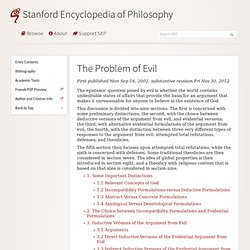

Russell’s Paradox [Internet Encyclopedia of Philosophy] Russell’s paradox represents either of two interrelated logical antinomies.
![Russell’s Paradox [Internet Encyclopedia of Philosophy]](http://cdn.pearltrees.com/s/pic/th/encyclopedia-philosophy-87616273)
The most commonly discussed form is a contradiction arising in the logic of sets or classes. Some classes (or sets) seem to be members of themselves, while some do not. The class of all classes is itself a class, and so it seems to be in itself. The null or empty class, however, must not be a member of itself. However, suppose that we can form a class of all classes (or sets) that, like the null class, are not included in themselves. Table of Contents 1. Russell’s discovery came while he was working on his Principles of Mathematics. Russell discovered the contradiction from considering Cantor’s power class theorem: the mathematical result that the number of entities in a certain domain is always smaller than the number of subclasses of those entities.
The paradox had profound ramifications for the historical development of class or set theory. Russell wrote to Frege concerning the contradiction in June of 1902. Nietzsche, Friedrich [Internet Encyclopedia of Philosophy] Nietzsche was a German philosopher, essayist, and cultural critic.
![Nietzsche, Friedrich [Internet Encyclopedia of Philosophy]](http://cdn.pearltrees.com/s/pic/th/nietzsche-friedrich-12365824)
His writings on truth, morality, language, aesthetics, cultural theory, history, nihilism, power, consciousness, and the meaning of existence have exerted an enormous influence on Western philosophy and intellectual history. Nietzsche spoke of "the death of God," and foresaw the dissolution of traditional religion and metaphysics. Some interpreters of Nietzsche believe he embraced nihilism, rejected philosophical reasoning, and promoted a literary exploration of the human condition, while not being concerned with gaining truth and knowledge in the traditional sense of those terms. However, other interpreters of Nietzsche say that in attempting to counteract the predicted rise of nihilism, he was engaged in a positive program to reaffirm life, and so he called for a radical, naturalistic rethinking of the nature of human existence, knowledge, and morality.
Table of Contents 1. 2. (i.) before 1869—the juvenilia (iv.) Descartes, Rene [Internet Encyclopedia of Philosophy] René Descartes is often credited with being the “Father of Modern Philosophy.” This title is justified due both to his break with the traditional Scholastic-Aristotelian philosophy prevalent at his time and to his development and promotion of the new, mechanistic sciences. His fundamental break with Scholastic philosophy was twofold. First, Descartes thought that the Scholastics’ method was prone to doubt given their reliance on sensation as the source for all knowledge. Second, he wanted to replace their final causal model of scientific explanation with the more modern, mechanistic model. Descartes attempted to address the former issue via his method of doubt.
Once this conclusion is reached, Descartes can proceed to rebuild his system of previously dubious beliefs on this absolutely certain foundation. Table of Contents 1. René Descartes was born to Joachim Descartes and Jeanne Brochard on March 31, 1596 in La Haye, France near Tours. Little is known of Descartes’ life from 1614-1618. Are We Real? The Problem of Evil. 1.

Some Important Distinctions 1.1 Relevant Concepts of God The term “God” is used with a wide variety of different meanings. These tend to fall, however, into two main groups. On the one hand, there are metaphysical interpretations of the term: God is a prime mover, or a first cause, or a necessary being that has its necessity of itself, or the ground of being, or a being whose essence is identical with its existence. On the other hand, there are interpretations that connect the term “God” in a clear and relatively straightforward way with religious attitudes, such as those of worship, and with very important human desires, such as the desires that good will triumph, that justice be done, and that the world not be one where death marks the end of the individual's existence.
What one has here, however, is not just a puzzle, since the question can, of course, be recast as an argument for the non-existence of God. If God exists, then God is omnipotent, omniscient, and morally perfect.